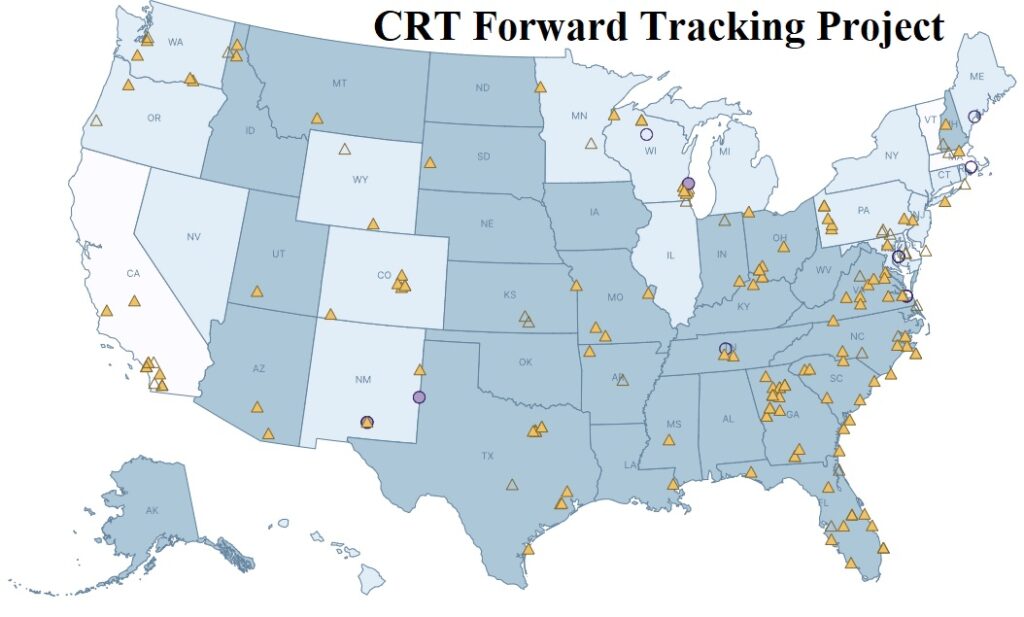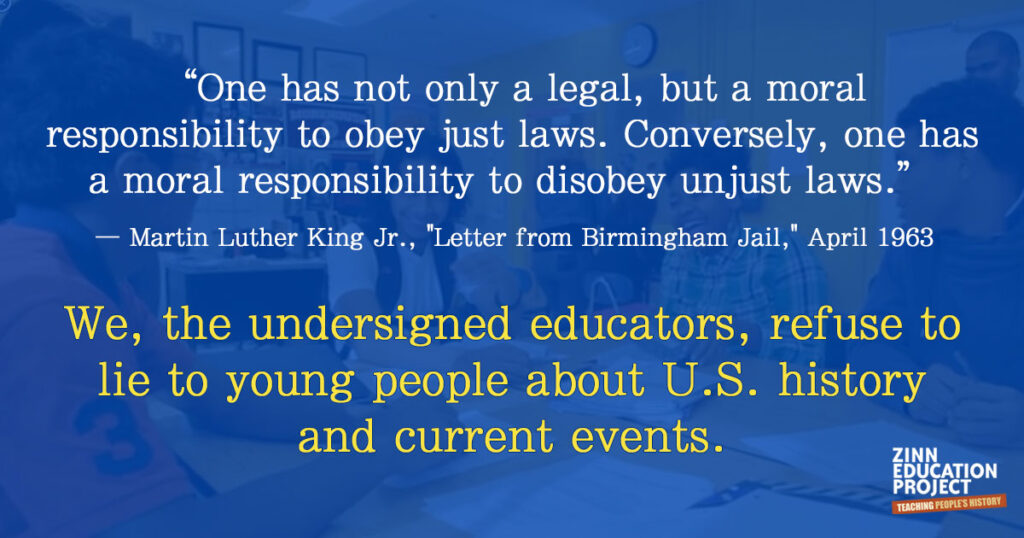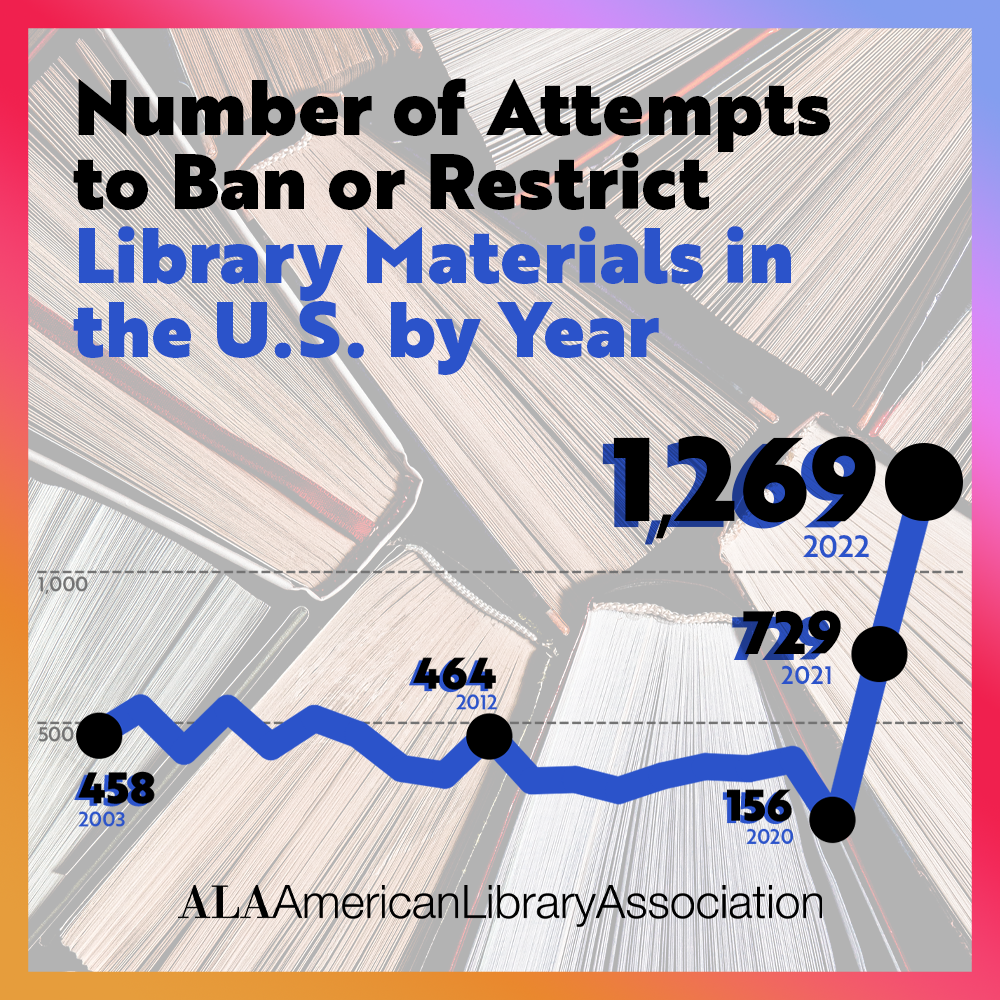Below are a variety of resources related to social justice, anti-racism, Diversity, Equity, and Inclusion (DEI), Social Emotional Learning (SEL), gender identity, Critical Race Theory (CRT) and related ideas currently under attack in Ohio and nationwide. If you have resources you would like featured, please let us know on our contact page and we can add them.
Ohio Resources
Ohio policy and advocacy information (Innovation Ohio)
Includes general information and links about HB 322/327, as well as how to get involved in submitting testimony in House hearings on these bills.
Honesty for Ohio Education (Statewide Coalition)
Honesty for Ohio Education is a nonpartisan, Ohio-based, statewide coalition that champions honest education, the affirmation of all identities, cultures, and lived experiences, and the rights and safety of all students, families, and educators. They serve as a centralized network for education, advocacy, and community building to protect honest education in the Ohio Statehouse, State Board of Education, and local school districts.
Honest in Education Resources (Ohio League of Women Voters)
Honesty in education is the complete presentation and critical examination of academic content that is grounded in facts, research, and credible sources. It reflects diverse perspectives, identities, and experiences. It invites open dialogue and debate, and appreciation of the complexity of issues. This approach helps to develop lifelong learners who are able to navigate our changing world, and help advance society. Ohio LWV page includes various resources, toolkits, and background on Ohio bills and legislative updates.
Resolution to Condemn Racism and to Advance Equity and Opportunity for Black Students, Indigenous Students and Students of Color (Ohio Board of Education July 2021)
The following is an excerpt from the Resolution adopted by the Ohio BOE. “As our nation grapples with the hard truths of racism and inequality, we are listening with broken hearts and engaging with determined spirits. We acknowledge that Ohio’s education system has not been immune to these problems, and while we earnestly strive to correct them, we have a great deal of work left to do. Whereas the Ohio Strategic Plan for Education: 2019-2024 Each Child, Our Future, adopted by a resolution of the State Board of Education in June, 2018 begins with the vision that in Ohio each child is challenged to discover and learn, prepared to pursue a fulfilling post-high school path and empowered to become a resilient, lifelong learner who contributes to society…therefore be it Resolved, that the State Board of Education condemns, in the strongest possible terms, white supremacy culture, hate speech, hate crimes and violence in the service of hatred. These immoral ideologies and actions deserve no place in our country, state and school system. And be it Further resolved, that the starting point of our work in racial equity must be reflection and internal examination, whereby the board will look for ways to engage our members in open and courageous conversations on racism and inequity…”
General Resources
CRT Forward – Interactive Map (UCLA Law)
A critical component of CRT Forward, the Tracking Project tracks, identifies, and analyzes measures aimed at restricting access to truthful information about race and systemic racism. These anti-CRT measures are captured across all levels of government and displayed on an interactive map.
Where Critical Race Theory Is Under Attack – Interactive Map (Education Week – updated regularly)
This map explores which states have introduced anti-CRT legislation of some kind, as well as the status of the legislation and links to more information about each state bill.
DEI Legislation Tracker (Chronicle of Higher Education – updated regularly)
This map tracks state legislation that seeks to prohibit colleges from having diversity, equity, and inclusion staff, using diversity statements, and related diversity bans.
The Assault on DEI (Chronicle of Higher Education)
This page on the Chron website includes the DEI Legislation tracker (see above) and recent news stories about DEI issues on campus and legislation impacting these issues.
Mapping Attacks on LGBTQ Rights (ACLU)
In the last few years states have advanced a record number of bills that attack LGBTQ rights, especially transgender youth. This ACLU is tracking map shows these attacks and work with national network of affiliates to support LGBTQ people everywhere.
United Against Book Bans (American Library Association)
Unite Against Book Bans is a national initiative organized by the ALA to empower readers to stand against censorship and the banning of books, and provides a variety of related resources.
Researching Banned or Challenged Books (American Library Association)
This resources guide page from the ALA provides a variety of informative and educational resources related to issues of banned books and intellectual freedom.
Right’s new social studies plan vows to fight CRT, wokeness and the “overthrow of America” (Salon 7/8/2022)
This investigative article in Salon details how the far-right Civics Alliance is attempting to impose its “American Birthright” historical propaganda into US schools through the vehicle of revised social studies standards. As Kathryn Joyce notes in her report, “a conservative education coalition called the Civics Alliance released a new set of social studies standards for K-12 schools, with the intention of promoting it as a model for states nationwide. These standards, entitled “American Birthright,” are framed as yet another corrective to supposedly “woke” public schools, where, according to Republicans, theoretical frameworks like critical race theory are only one part of a larger attack on the foundations of American democracy.”
The Intersectionality Wars (Vox News 5/28/2019)
An excellent interview with a leading CRT scholar Kimberlé Crenshaw. As the article notes, “In my conversations with right-wing critics of intersectionality, I’ve found that what upsets them isn’t the theory itself. Indeed, they largely agree that it accurately describes the way people from different backgrounds encounter the world. The lived experiences — and experiences of discrimination — of a black woman will be different from those of a white woman, or a black man, for example. They object to its implications, uses, and, most importantly, its consequences, what some conservatives view as the upending of racial and cultural hierarchies to create a new one. But Crenshaw isn’t seeking to build a racial hierarchy with black women at the top. Through her work, she’s attempting to demolish racial hierarchies altogether.”
50 Years Ago, “Anti-Woke” Crusaders Came for My Grandfather (History News Network 1/15/2023)
As Mat Jacobs argues in this insightful piece on the regurgitated culture wars of an earlier era “While the bogeyman of CRT is a new iteration, [Christopher] Rufo’s objections fit into the long history of the politics of American education. Like his predecessors, Rufo misrepresents ideas critical of conservative hegemony in order to maintain it. “I am quite intentionally,” Rufo tweeted, “redefining what ‘critical race theory’ means in the public mind, expanding it as a catchall for the new orthodoxy. People won’t read Derrick Bell, but when their kid is labeled an ‘oppressor’ in first grade, that’s now CRT.” But if the public does read Bell, they will see the fallacious humbug Rufo has concocted.”
Reports and Research
The Political Machine Behind the War on Academic Freedom (Aug 2023)
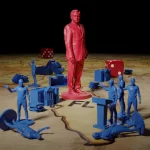 This investigative article looks at some of the key rightwing NGOs driving the attack on higher education, especially legislative efforts to ban DEI, anti-racism, CRT, and gender education from university classrooms across the nation. Focusing on Florida and Texas as leading examples of these rightwing efforts, the piece delves into the players and strategies that have emerged since 2020 from the right to undermine and destroy critical education in the US. As author Steven Brint argues:
This investigative article looks at some of the key rightwing NGOs driving the attack on higher education, especially legislative efforts to ban DEI, anti-racism, CRT, and gender education from university classrooms across the nation. Focusing on Florida and Texas as leading examples of these rightwing efforts, the piece delves into the players and strategies that have emerged since 2020 from the right to undermine and destroy critical education in the US. As author Steven Brint argues:
“By the summer of 2023, governors of eight states had signed into law curriculum-content restrictions aimed at higher education. Governors in five states had signed into law restrictions on diversity, equity, and inclusion, and legislatures in 12 states were considering similar bills restricting curriculum or DEI or both. In 11 states, bills restricting course content or banning DEI had died in committee or had been vetoed by Democratic governors. Legislators and governors in 15 states — most of them with large Democratic majorities — had shown no interest in pursuing either course content or DEI restrictions through legislation.”
CRT Forward: Tracking the Attack on Critical Race Theory (April 2023)
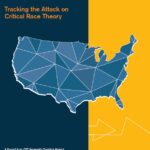 This report documents the emergence and spread of attacks on CRT, demonstrating how laws, policies, and other government actions linked to anti-CRT advocacy have infiltrated federal, state, and local governments and broadly restricted — and chilled — the ability of students and teachers to speak truthfully about race, racism, and systemic racism. As the report notes:
This report documents the emergence and spread of attacks on CRT, demonstrating how laws, policies, and other government actions linked to anti-CRT advocacy have infiltrated federal, state, and local governments and broadly restricted — and chilled — the ability of students and teachers to speak truthfully about race, racism, and systemic racism. As the report notes:
For the period of January 1, 2021 through December 31, 2022, CRT Forward has identified and followed the progress of 563 anti-“CRT” measures, introduced at nearly even rates in 2021 (280) and 2022 (283). These have emerged from state and/or local authorities in every U.S. state besides Delaware. The nation’s 25 red states are responsible for 63% of all introduced measures; the 20 blue states, for 21% of the total; and the 5 purple states, 16%. Over calendar years 2021 and 2022, a total of 241 of these 563 introduced measures were enacted or adopted.
Banned in the USA: The Growing Movement to Censor Books in Schools (Sept 2022)
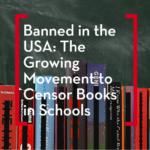 This new report from PEN America builds on the Jan 2022 Educational Gag Orders report to looks at the growing nationwide movement led by far-right activists and politicians to impose sweeping book ban orders across US schools and public institutions. As the report notes, “From July 2021 to June 2022, PEN America’s Index of School Book Bans lists 2,532 instances of individual books being banned, affecting 1,648 unique book titles.” The report also notes that “The 1,648 titles are by 1,261 different authors, 290 illustrators, and 18 translators, impacting the literary, scholarly, and creative work of 1,553 people altogether.”
This new report from PEN America builds on the Jan 2022 Educational Gag Orders report to looks at the growing nationwide movement led by far-right activists and politicians to impose sweeping book ban orders across US schools and public institutions. As the report notes, “From July 2021 to June 2022, PEN America’s Index of School Book Bans lists 2,532 instances of individual books being banned, affecting 1,648 unique book titles.” The report also notes that “The 1,648 titles are by 1,261 different authors, 290 illustrators, and 18 translators, impacting the literary, scholarly, and creative work of 1,553 people altogether.”
Over the 2021–22 school year, what started as modest school-level activity to challenge and remove books in schools grew into a full-fledged social and political movement, powered by local, state, and national groups. The vast majority of the books targeted by these groups for removal feature LGBTQ+ characters or characters of color, and/or cover race and racism in American history, LGBTQ+ identities, or sex education.
This movement to ban books is deeply undemocratic, in that it often seeks to impose restrictions on all students and families based on the preferences of those calling for the bans and notwithstanding polls that consistently show that Americans of all political persuasions oppose book bans. And it is having multifaceted, harmful impacts: on students who have a right to access a diverse range of stories and perspectives, and especially on those from historically marginalized backgrounds who are watching their library shelves emptied of books that reflect and speak to them; on educators and librarians who are operating in some states in an increasingly punitive and surveillance-oriented environment with a chilling effect on teaching and learning; on the authors whose works are being targeted; and on parents who want to raise students in schools that remain open to curiosity, discovery, and the freedom to read.
Educational Gag Orders: Legislative Restrictions on the Freedom to Read, Learn, and Teach (Jan 2022)
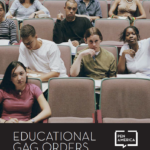 This report from PEN America documents the growing attack during 2021 on literary freedom and nationwide efforts by far-right activists and politicians to impose public book bans in the US. As this new PEN America report notes:
This report from PEN America documents the growing attack during 2021 on literary freedom and nationwide efforts by far-right activists and politicians to impose public book bans in the US. As this new PEN America report notes:
Between January and September 2021, 24 legislatures across the United States introduced 54 separate bills intended to restrict teaching and training in K-12 schools, higher education, and state agencies and institutions. The majority of these bills target discussions of race, racism, gender, and American history, banning a series of “prohibited” or “divisive” concepts for teachers and trainers operating in K-12 schools, public universities, and workplace settings. These bills appear designed to chill academic and educational discussions and impose government dictates on teaching and learning. In short: They are educational gag orders.
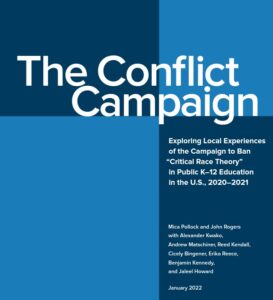 This new report reviews some of the loudest anti-CRT proponents and analyzes anti “CRT” websites, toolkits, Facebook groups, and media appearances to understand their shared language, tactics, and logic. It also analyzes survey and interview data from educators affected through early fall 2021, drawing on survey responses from 275 members of a set of national teacher organizations that support teachers who tend toward teaching on race and diversity, as well as an interview study of 21 “equity officers” (EOs) in district diversity, equity, and inclusion (DEI) roles across the country. The study also examines over 10,000 media stories on “CRT” and public schools (Sept 2020 – Aug 2021). It found that at least 894 school districts, enrolling 17,743,850 students, or 35% of all K–12 students in the United States, have been impacted by local anti “CRT” efforts.
This new report reviews some of the loudest anti-CRT proponents and analyzes anti “CRT” websites, toolkits, Facebook groups, and media appearances to understand their shared language, tactics, and logic. It also analyzes survey and interview data from educators affected through early fall 2021, drawing on survey responses from 275 members of a set of national teacher organizations that support teachers who tend toward teaching on race and diversity, as well as an interview study of 21 “equity officers” (EOs) in district diversity, equity, and inclusion (DEI) roles across the country. The study also examines over 10,000 media stories on “CRT” and public schools (Sept 2020 – Aug 2021). It found that at least 894 school districts, enrolling 17,743,850 students, or 35% of all K–12 students in the United States, have been impacted by local anti “CRT” efforts.
2022’s States with the Most Racial Progress (Wallet Hub 1/11/2022)
 In 2021, conversations on race have remained prevalent, with high-profile police brutality cases going to trial, and protests continuing. These discussions seem to be making an impact, too – according to a recent survey by the Pew Research Center, 50% of U.S. adults say “a lot” more needs to be done to ensure equal rights for all Americans, and only 15% believe “nothing” needs to be done.
In 2021, conversations on race have remained prevalent, with high-profile police brutality cases going to trial, and protests continuing. These discussions seem to be making an impact, too – according to a recent survey by the Pew Research Center, 50% of U.S. adults say “a lot” more needs to be done to ensure equal rights for all Americans, and only 15% believe “nothing” needs to be done.
As we think about future improvement, it’s important to recognize the racial harmony we’ve achieved — in our workplaces, in our schools and in our voting booths. To that end, WalletHub measured the gaps between black people and white people across 21 key indicators of equality and integration in each of the 50 states and the District of Columbia. Our data set ranges from median annual household income to standardized-test scores to voter turnout.
Understanding the Attacks on Critical Race Theory (National Education Policy Center 9/23/2021)
Attacks on Critical Race Theory have been in the news for over a year. Rallies have been organized, school board meetings disrupted, executive orders issued, and legislation introduced to remove or exclude CRT from school curriculum. Since early 2021, eight states have passed legislation that, broadly speaking, seeks to ban historical information and critical analysis related to race and racism in public school classrooms, and additional legislation is being considered. Advocates of these administrative and legislative actions argue that providing students with information on race and racism is un-American, divisive, and itself racist. This policy memo reviews the contemporary attacks against CRT, describes the political objectives of these attacks, explores historical examples of similar tactics, and provides resources on evidence-based strategies to counter the propaganda.
 Koch Funded Moral Panic: Ultra Right Think Tanks and Critical Race Theory (UnKoch My Campus Fall 2021)
Koch Funded Moral Panic: Ultra Right Think Tanks and Critical Race Theory (UnKoch My Campus Fall 2021)
We reviewed the published materials of 28 think tanks and political organizations affiliated with the Koch network and analyzed the rhetorical tactics Koch network think tanks have deployed around Critical Race Theory(CRT) and their efforts to ban it from public schools. During the investigation period, we found that Koch network think tanks published 79 articles, podcasts, reports, or videos about CRT.
Koch-affiliated national think tanks like the Heritage Foundation, FreedomWorks, and the Manhattan Institute, among others, have used their influence to generate and spread talking points, briefed state and federal legislators on model policy, and attempted to generate grassroots mobilization against local school districts. This influence is not without consequence: State politicians were almost entirely silent on the topic until Koch-funded entities started pushing the issue earlier this year. Now, more than 25 states have introduced legislation or taken other action that, backers claim, is aimed at banning “critical race theory” (CRT) from schools and government programs. Several of these states have already passed these bills.
Right-Wing Legislators Are Trying to Stop Us from Teaching for Racial Justice. We Refuse. (rethinking schools Vol 35, No 4 Summer 2021)
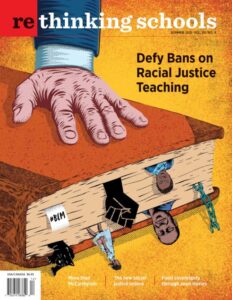
Lawmakers in a growing number of states are attempting to pass legislation that would require teachers to lie to students about the past and present. The bill introduced in the Missouri legislature exemplifies a rash of similar bills — in Arizona, Arkansas, Idaho, Iowa, Louisiana, New Hampshire, Ohio, Oklahoma, North Carolina, Rhode Island, Tennessee, Texas, Wisconsin, West Virginia, and others. It bans teaching that “identifies people or groups of people, entities, or institutions in the United States as inherently, immutably, or systemically sexist, racist, anti-LGBT, bigoted, biased, privileged, or oppressed.”
Since these laws seem to be written with the intent to confuse, let’s focus on just a few terms from the comma-laden lists of the Missouri law: institutions, systemically, racist. Under the Missouri legislation an educator could not, without penalty, teach their students that the authors of the U.S. Constitution (establishing the institutions of the U.S. government) included multiple protections for enslavers and slavery (another institution), making white supremacy (racism) foundational (systemic), to the United States.
Pledge to Teach the Truth (rethinking education, The Zinn Education Project, Teaching for Change 2021)
To respond to the right-wing legislation across the country, which attacks racial justice teaching, the Zinn Education Project organized a “Pledge to Teach the Truth” and invited educators to say why they refuse to be intimidated. Here are a few of the more than 5,000 pledges that had been signed by July. The Zinn Education Project is coordinated by Rethinking Schools and Teaching for Change.
Counter-Narrating the Attacks on Critical Race Theory (Race Forward 6/4/2021)
Essential conversations about race in America are being hijacked and curtailed by broad narrative attacks launched by Christopher Rufo, Senior Fellow at the Manhattan Institute. The attacks by Rufo and other critics, pundits, and politicians who have joined the effort are shutting down critical racial equity work and conversations in institutions across the country—primarily schools, universities, and government—and are extending further into our society.
How to Manufacture a Moral Panic (New York Magazine 7/11/2021)
From the New York Magazine article: “Last summer, Rufo seemed to come from nowhere, arriving on the scene after a national uprising against racism to lead the charge against the supposed excesses of anti-racism education, branding it all with a once-obscure academic term: critical race theory. Armed with a prolific Twitter account and the backing of the conservative Establishment, he brandished “scoops” about the widespread infiltration of the theory and eventually caught the attention of the Trump White House. In short order, he had transformed himself from a limited kind of Twitter star to bona fide conservative influencer. The proof lies offline in the new moral panic he helped instigate. Republican operatives, legislators, and commentators, all professing concern for young hearts and minds, claim that children are being taught to hate white people.”
How a Conservative Activist Invented the Conflict Over Critical Race Theory (New Yorker 6/18/2021)
From the New Yorker article: “As Rufo eventually came to see it, conservatives engaged in the culture war had been fighting against the same progressive racial ideology since late in the Obama years, without ever being able to describe it effectively. “We’ve needed new language for these issues,” Rufo told me, when I first wrote to him, late in May. “ ‘Political correctness’ is a dated term and, more importantly, doesn’t apply anymore. It’s not that elites are enforcing a set of manners and cultural limits, they’re seeking to reengineer the foundation of human psychology and social institutions through the new politics of race, It’s much more invasive than mere ‘correctness,’ which is a mechanism of social control, but not the heart of what’s happening. The other frames are wrong, too: ‘cancel culture’ is a vacuous term and doesn’t translate into a political program; ‘woke’ is a good epithet, but it’s too broad, too terminal, too easily brushed aside. ‘Critical race theory’ is the perfect villain,” Rufo wrote.”
On Critical Race Theory and Intersectionality – Resolution #9 (Southern Baptist Convention 6/1/2019)
From Resolution #9: “WHEREAS, Concerns have been raised by some evangelicals over the use of frameworks such as critical race theory and intersectionality; and
WHEREAS, Critical race theory is a set of analytical tools that explain how race has and continues to function in society, and intersectionality is the study of how different personal characteristics overlap and inform one’s experience; and
WHEREAS, Critical race theory and intersectionality have been appropriated by individuals with worldviews that are contrary to the Christian faith, resulting in ideologies and methods that contradict Scripture; and […]
RESOLVED, That the messengers to the Southern Baptist Convention meeting in Birmingham, Alabama, June 11–12, 2019, affirm Scripture as the first, last, and sufficient authority with regard to how the Church seeks to redress social ills, and we reject any conduct, creeds, and religious opinions which contradict Scripture; and be it further
RESOLVED, That critical race theory and intersectionality should only be employed as analytical tools subordinate to Scripture—not as transcendent ideological frameworks; and be it further…”

